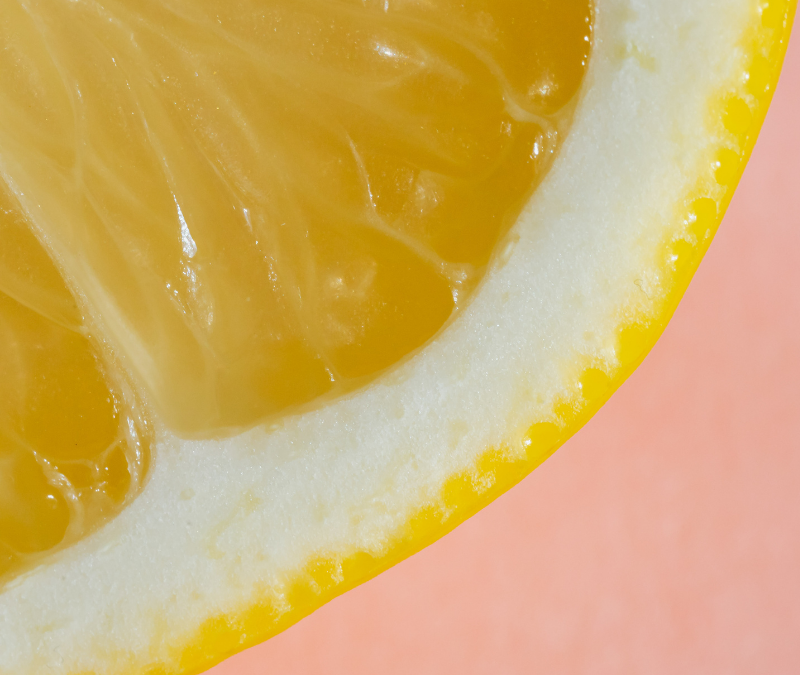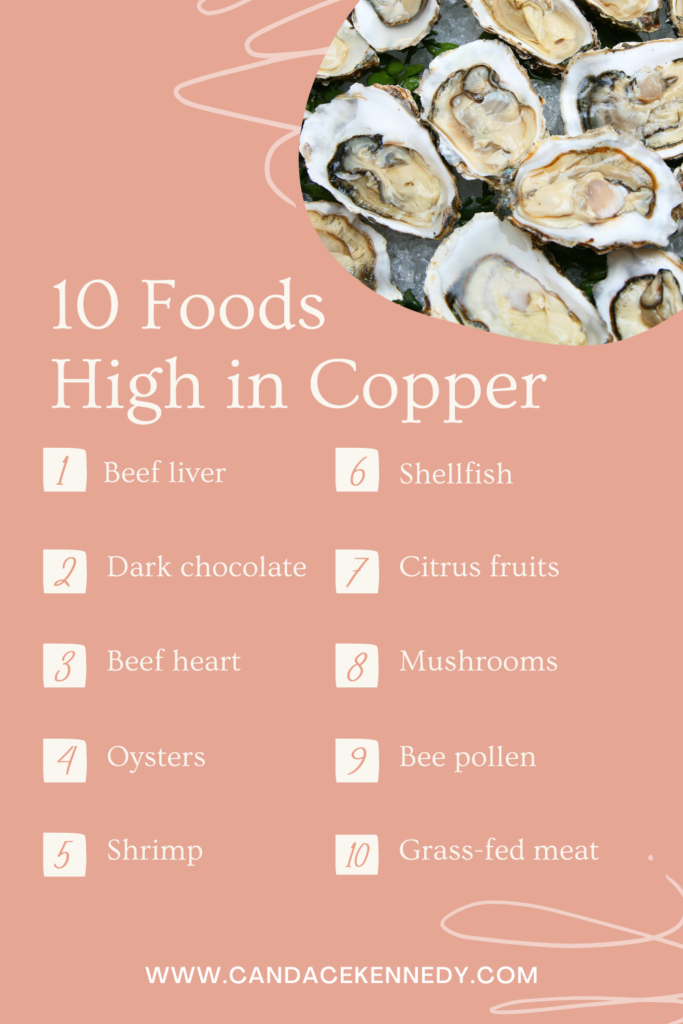Eating enough vitamins and minerals is crucial for your body to function and thrive. Among many things, vitamins and minerals support your metabolism, boost your immunity and act as antioxidants.
Your body can’t make most of the essential vitamins and minerals it needs, so knowing which foods to eat will help you get optimal amounts of these nutrients. Another thing to note is that while our body can make some vitamins, it cannot make minerals, which is why it’s so important to prioritize mineral-rich foods.
In this article, we’ll cover five vitamins and minerals that are essential for optimal health and you might not be getting enough of them.
1. Copper
Why You Need Copper:
Copper is essential for our cells to produce energy in the form of ATP. Without enough bioavailable copper, your body can’t produce enough energy. Without enough energy, our bodies can’t stay healthy. It’s as simple and as complicated as that. Copper is needed for thyroid function, immune function, and for our livers, hearts, brains, adrenals to work optimally. A lack of bioavailable copper can create signs of “anemia” when in reality, it’s a lack of copper that is keeping iron from circulating and instead, iron gets stuck in our tissues.
It’s important to note that copper requires retinol to function properly. Nothing in our bodies works in isolation. This is why getting our nutrients from real, whole foods is critical. Real food has all of the nutrients and enzymes in the right ratios and with the right co-factors. The copper-carrying protein, ceruloplasmin, requires bioavailable copper and retinol to function. Low levels of ceruloplasmin increase oxidative stress in the body. When stress increases in the body, so does cholesterol. While cholesterol is not bad, it’s important to understand why cholesterol levels are elevated. If it’s due to oxidative stress, that can be problematic.
Best food sources of copper:
The best sources of dietary copper are:
- Dark chocolate
- Beef liver
- Beef heart
- Oysters
- Shrimp
- Shellfish
- Citrus fruits
- Mushrooms
- Bee pollen
- Grass-fed meat is also a good source of copper.
In some cases, people can benefit from supplementing with a high-quality, bioavailable copper supplement like Recuperate IQ. However, it’s important to first know your copper status BEFORE supplementing through an HTMA and Full Iron Panel (ask me about testing copper status).
2. Magnesium
Why You Need Magnesium:
Magnesium is involved in nearly every process of your body and in over 400 enzyme systems. It works mostly inside your cell to help produce ATP, an immediate source of energy for your body’s cells. Magnesium helps nutrients enter your cells and wastes exit your cells. It’s also considered the “relaxation mineral” because it helps your muscles relax.
Sadly, over half of the US population is magnesium deficient, and this number could be much higher.[2] Our soils and water used to be full of magnesium, so deficiency wasn’t as much of a problem. Due to modern-day farming practices, our soils are now pretty depleted of magnesium and many other minerals. Water is no longer a good source of magnesium as most water has added fluoride. Fluoride binds with magnesium, creating a compound that gets deposited into bones, in a compound not beneficial to the body.[3, 4]
Best food sources of magnesium:
- Dark chocolate (look for a high-quality organic dark chocolate like this one)
- Cacao
- Cooked leafy greens,
- Sprouted pumpkin seeds
- Avocado
Since it’s now difficult to get enough magnesium through food, you may want to consider supplementing with magnesium. You can talk to your integrative physician about how much magnesium would be right for you and then work with your nutritionist to find the best sources.
My favorite magnesium supplements are:
- Jigsaw Magnesium Malate
- Pure Encapsulations Magnesium Glycinate
- Crucial Four Magnesium Bicarbonate
I have a whole post on magnesium supplementation if you want to dive deeper into this topic.
3. Potassium
Why You Need Potassium:
This electrolyte works with sodium to balance your body’s pH and water content. It’s also important for your nervous system and heart rhythm regulation. Adequate intake of potassium supports well-functioning bones, kidneys, and cardiovascular system [5].
Potassium is super important to women with PCOS and those struggling with blood sugar issues. Potassium has an insulin-like effect and helps get blood sugar into the cells.
Best sources of potassium:
- Bone broth
- Kiwi
- Coconut water
- Aloe vera juice
- Cantaloupe
- Peaches
- Bananas
- Codfish
- Avocados
- Apricots
I have a whole post dedicated to meeting your daily potassium target. I like to aim for a minimum of 4700 mg per day.
Like many essential nutrients, potassium needs several nutrient cofactors to do its job. These cofactors include vitamin B6, sodium, magnesium, and calcium. The great part about getting potassium from foods is that those foods also contain many or all of these cofactors, so you don’t have to worry about it too much if you’re eating a wide variety of vegetables and some high-quality protein.
4. Vitamin E
Why You Need Vitamin E:
Vitamin E is almost synonymous with healthy hair and skin. But this powerful antioxidant protects more than just the skin. It also helps protect the arteries, lungs and heart. Vitamin E is also beneficial to circulation and may help women who suffer from menstrual cramps. It supports the immune system and helps protect other fat-soluble vitamins.
Best sources of vitamin E:
You can get vitamin E from dietary sources such as avocado, but this is a nutrient I find that many people find it difficult to get enough. I like the vitamin supplement, PUFA Protect, from Mitolife.
5. Vitamin B12
Why You Need Vitamin B12:
While vitamin B12 is only required by a few enzymes in the body, these enzymes are of utmost importance. This nutrient is needed by enzymes that support DNA synthesis and energy metabolism, which makes B12 essential for optimal health. Vitamin B12 is stored in the body so deficiencies can take years to show signs. Deficiency in B12 can be common among vegans as B12 is mostly found in animal products.
Best sources of vitamin B12:
The best sources of B12 are:
- Grass-fed meat
- Organ meats
- Pasture-raised eggs
- Wild seafood
- Raw dairy products.
References:
[1] http://www.aafp.org/afp/2007/0301/p671.html
[2] http://www.ars.usda.gov/Services/docs.htm?docid=15672
[3] https://www.ncbi.nlm.nih.gov/pmc/articles/PMC3956646/
[4] https://www.ncbi.nlm.nih.gov/pmc/articles/PMC3690253/
[5] Balch, Phyllis A. Prescription for Nutritional Healing. New York: Avery, 2010. Print.




I didn’t realize bone broth was a good source of potassium. Or that bananas weren’t enough to do the trick. Thanks for the tips!
Bone broth is a great source of many minerals, especially potassium! and yep! We need to be more intentional about potassium intake because getting enough isn’t all that easy.
What are your thoughts on vitamin B12 supplements? Of course everything is better to get through food, but wondering if its not recommended like Vitamin D etc.. thanks!
I think there’s a time and a place for B12 supplements, but there are also important questions to ask when someone is “low” in b12, as it’s very easy to get from food, so long as you’re not vegan. “Low” b12 on lab work can be a symptom of low stomach acid or a sluggish liver. B12 status can also be affected by iron/copper metabolism. But, if someone is truly struggling or needs to bridge the gap while working on things above, taking a methylated form or, I prefer one by seeking health that is Hydrox-Adeno B12. It’s important to note that supplementing synthetic b vitamins can waste potassium though and also through other b’s out of balance.